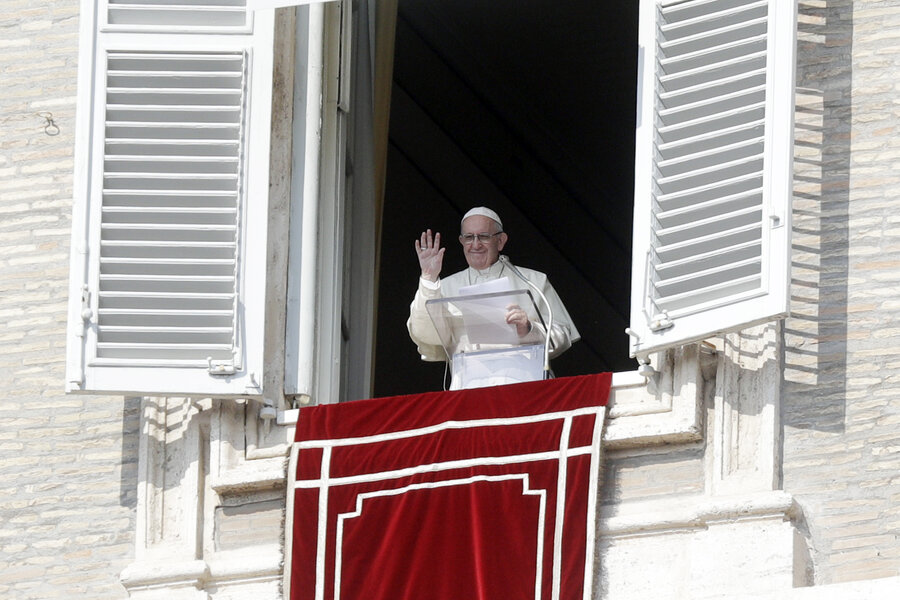Pope Francis to consider opening the priesthood to married men
Loading...
| Vatican City
As the Vatican copes with the growing clergy sex abuse scandal and declining number of priests worldwide, it is laying the groundwork to open formal debate on an issue that has long been taboo: opening up the priesthood to married men in parts of the world where clergy are scarce.
Pope Francis has convened a meeting of South American bishops next year focusing on the plight of the church in the Amazon, a vast territory served by far too few priests. During that synod, the question of ordaining married men of proven virtue – so-called "viri probati" – is expected to figure on the agenda.
This week, a two-hour documentary on Italian television is likely to contribute to the conversation. "The Choice: Priests and Love" profiles more than a dozen men in four European countries who are either living clandestinely with women, have created their own unsanctioned church communities where married priests preside at Mass, or left the Catholic priesthood altogether to marry.
The documentary, to be aired Oct. 24 on Discovery Italia and previewed to The Associated Press, makes the case that many of these men would gladly return to the priesthood and offer their pastoral services.
Their plight has found a sympathetic ear in Francis, who has long expressed a willingness to consider "viri probati" to address pastoral needs in the Amazon. He has also expressed sympathy for priests who have made the anguished choice to leave.
Vocatio, an Italian association of these "married priests," wrote Francis earlier this month pledging their solidarity as he copes with the global fallout of the sex abuse scandal, and once again offering their services in ministry.
"We would like you to take into consideration – without prejudice or pretense – the opportunity of allowing us an active presence in diocesan activity, given our experience and competence in the sacraments we have lived: ministry and matrimony," the group wrote.
The head of Vocatio, former priest Rosario Mocciaro who married civilly in 1977, estimates there are about 5,000 men in Italy alone who have left the priesthood, a third of whom would seek a return to married ministry if allowed. He said he was hopeful for progress under Francis and some sympathetic Italian bishops, saying they brought "a new air and atmosphere" to a long-standing problem.
"The possibility of having 'viri probati' would be a great opening, a great step forward," he told AP, adding it would begin to sensitize the church and public opinion to the prospect of both a married and a celibate priesthood.
The celibate priesthood has been a tradition of the Latin rite Catholic Church since the 11th century; no doctrine requires it, and many eastern rite Catholic Churches allow married men to be ordained. In addition, the Catholic Church allows married Anglican clergy who convert to remain in priestly ministry.
Francis has long said he appreciates the discipline of celibacy, but that it can change given it is discipline, not doctrine.
History's first Latin American pope has been particularly attentive to the argument in favor of the "viri probati" in the Amazon, where the mostly indigenous faithful can go months without seeing a priest, and where Protestant and evangelical churches are wooing away Catholic souls.
While the situation is particularly grave there, overall the number of priests worldwide has dropped for another consecutive year – down 687 to 414,969 – while the global Catholic population has grown by 14.25 million, according to recent figures from the Vatican's Fides missionary service.
Opening the priesthood to married men, even in limited and localized places, would open the question of providing financially for the priests' families – an expense long cited as a key reason for the imposition of celibacy in the 11th century: The church didn't want its assets to pass down to priests' heirs.
The issue of providing for the children of priests, however, is already on the agenda at the Vatican and in bishops conferences and religious orders around the world, given the cases of priests who violate their celibacy vows and have children secretly.
An Irish psychotherapist and son of a priest, Vincent Doyle, has founded an online resource, Coping International, to offer assistance for priests' children, who often endure depression, anxiety, and other mental health issues blamed on the silence imposed on them by the church.
Mr. Doyle has successfully petitioned the pope's Pontifical Council for the Protection of Minors – his hand-picked sex abuse advisory committee – to consider the issue of priests' children to be part of its mandate, given some of these children are born to minors.
"Our expectation is that from this process will emerge initiatives that can contribute to the healing of those impacted by this issue," wrote commission member Neville Owen, who heads the commission's committee on guidelines.
This story was reported by The Associated Press.







